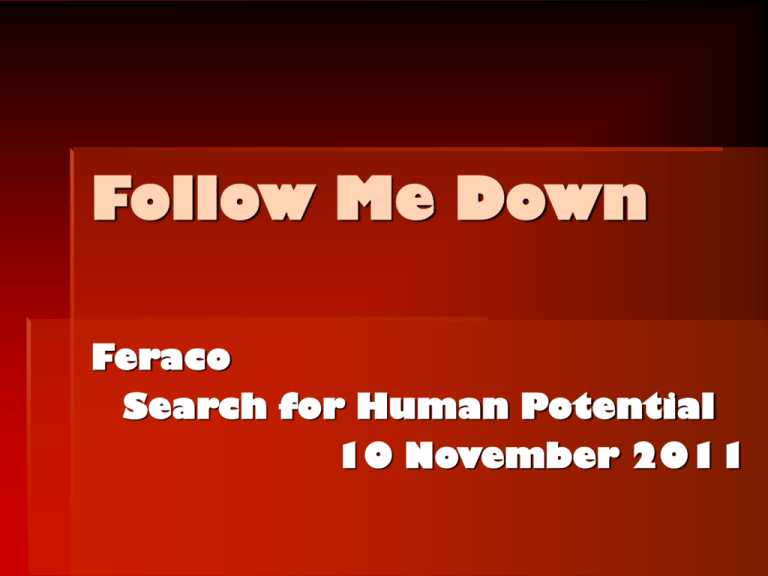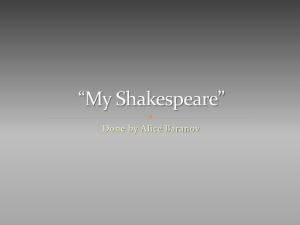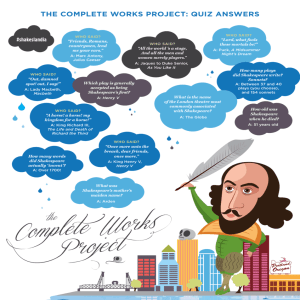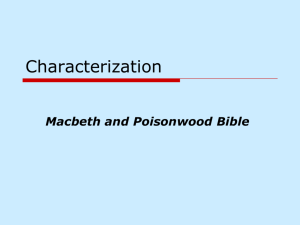Follow Me Down
advertisement

Follow Me Down Feraco Search for Human Potential 10 November 2011 If you gaze long into an abyss, the abyss will gaze back into you. Frederick Nietzsche We are merely the stars’ tennis balls, struck and banded, which way chooses. John Webster Maybe all one can do is hope to end up with the right regrets. Arthur Miller Just Your Average Shakespeare At first blush, Macbeth looks something like the Shakespearean plays you’ve read over your high-school careers. True, the playwright forsakes the sonnetheavy style of Romeo and Juliet, typically resorting instead to blank (non-rhyming) verse. The Weïrd Sisters are the only figures who consistently speak in rhyme This makes a certain amount of sense, considering that they stand outside of the chaotic events consuming the other characters’ lives. But those ten-syllable lines, written in that familiar alternating-stress-and-unstress style, are easy to mistake for “regular Shakespeare.” Going…Backwards? That initial sense of familiarity quickly gives way to an inescapable conclusion: Shakespeare’s linguistic structures are far more disordered than in his earlier works. Those ten-syllable lines do not, in fact, consistently follow the unstress/stress rhythms we found in, say, Romeo and Juliet Shakespeare’s iambic pentameter helped define him, but perfect examples of it rarely appear here. While we might expect Shakespeare’s language to get cleaner as he matures – although it has an uncertain completion date, Macbeth was finished near the end of his career, and was almost certainly written at least a decade after Romeo and Juliet – two important things are going on here. Confidence and Experiments Firstly, Shakespeare actually tended to experiment more with language as he aged. Rather than leave behind youthful precociousness for a staid, steady adult style, the playwright behaved like a man who, having mastered the fundamental methods of dribbling a basketball, swore never to use those methods again and dedicated himself instead to discovering how many unconventional ways he could bounce the ball. Confidence, not a lack of skill, drove Shakespeare to break from the linguistic routines he’d built for himself, and enabled him to challenge the expectations of viewers who would have seen some of his other plays. Disorder, Disorder… More importantly, the newly disordered structure of the language, when combined with the cause/effect nature of the play’s human behaviors and choices, reflects the play’s disordered world and action. The specter of disorder, of things falling apart (a la War), hangs over everything in the play. Take the Weïrd Sisters’ chant – “Fair is foul, and foul is fair” – which virtually kicks off the script, as the witches meet before the Scots’ battle with the rebels (and Norwegians!) has finished. Shakespeare uses the witches’ chant to foreshadow his play’s blurring/reversal of moral lines. Macbeth, like Sisko, is a (mostly) good man who’s quickly swallowed by a darkness much larger than himself, and who ultimately succumbs to it. Tension and Thrill But the tension between order and disorder, expectation and free will, between doing what’s “right” and doing what’s easy, informs almost every other character’s choices as well. When Duncan allows himself to trust others in the wake of the Thane of Cawdor’s betrayal, it seems like a moment worthy of applause It takes great courage to reach out to others under any circumstances, let alone after someone you cared about used that trust as a weapon. Lonely Rests the Crown But Duncan’s willingness to trust someone gets him killed, destabilizing his already war-torn nation even further. As a responsible leader, does he even have the luxury of suspending his skepticism? Or is that one of the tradeoffs you make when assuming the mantle of responsibility – the counterintuitive swapping of power for insecurity? Courageous Cowardice Moreover, young Malcolm and Donalbain’s decision in the wake of their father’s murder seems prudent at first. Consider that, while it “appears” Duncan’s killers have already gotten their just desserts, the young men aren’t fooled into relaxing their guard. Rather than get complacent – simply assuming the throne, as would have been expected of Malcolm – the two, realizing that the threat remains, decide to flee the homeland. At All Costs, By Any Means This isn’t a simple matter of selfpreservation: if it were, the decision to split up seems shortsighted, since the two would be safer together than apart. The fact that they do split up indicates that preservation of the royal line – here we get child/family/lineage issues yet again, which makes sense considering the nature of how power and wealth are transmitted in ancient Scottish society – takes precedence over everything else. Backfire Yet that seemingly prudent plan – go into hiding, identify the threat, call on our father’s allies, retake the throne once the killer reveals himself and we’ve eradicated him – is undermined by the manner in which they carry it out. By not announcing to everyone that the killer’s been found, their decision to flee conveys cowardice. On the one hand, this theoretically buys them time; the killer, seeing them depart of their own volition, apparently panicked and afraid, won’t dedicate many resources to coming after them. On the other hand, the panicked/fearful reaction is all the Scottish people will see; their “cowardice” makes it easy for Macbeth to pin the blame for Duncan’s murder on them once they’ve fled. Control and Blindness Other characters, such as Macduff and Macbeth himself, go on to do the same type of thing: make a decision that seems reasonable at the time, only to unintentionally bring about the circumstances that lead to their downfalls. There seems to be a running question of whether man, for all his planning, scheming, strategizing, and cleverness, really has a say in what happens to him, or control over both actions and consequences – whether we are, in fact, capable of seeing how things work, and whether we have any power over the universe beyond acting in accordance with the rules of the chessboard. Control and blindness are pet themes of Shakespeare’s, as anyone who’s read any of his tragedies can attest. The Queen’s Prison If the universe is a chessboard, we’d like to think of ourselves as queens – able to move as freely as we like through our lives, confident and in control. But even the queen is limited – she can only move once before she’s forced to wait for her opponent’s reaction, which she must then process and react to accordingly. In other words, a seemingly free actor is bound by a surprising number of restrictions. A frequent reader of Shakespeare often wonders whether we, or the stars, ultimately determine what happens on the earthly plane. For if we can’t choose to defy our fates…can we really condemn anyone for their actions?







